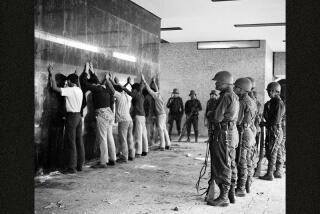Cuban Exiles Remember Day of Downed Cessnas
- Share via
MIAMI — A year ago today, the long, rocky road of U.S.-Cuban relations seemed headed for resurfacing. Diplomats in Havana and Washington were quietly talking, academic exchanges between the two nations were commonplace, and even here in the exile community moderate voices were rising above the constant hard-line roar.
But then, on a sunny afternoon over the Straits of Florida, Cuban MIGs fired two air-to-air missiles at a pair of unarmed Cessna 337 Skymasters piloted by members of the exile group Brothers to the Rescue. Dead in an instant were four young fliers--and any hopes of a breakthrough in the decades-long ideological stalemate between the United States and the government of President Fidel Castro.
“That shoot-down essentially ended the [United States’] carrot-and-stick approach toward Cuba, the process of opening, which most of us believed was positive,” said Eduardo Gamarra, professor of Latin American affairs at Florida International University. “I don’t see much chance of any significant improvements in Cuba-U.S. relations for some time.”
In south Florida, several religious and community events are scheduled to mark the anniversary of the Feb. 24 incident, which among many Cuban Americans ranks with the failed Bay of Pigs invasion in 1961, the 1962 Cuban missile crisis, the 1980 Mariel boat lift and the 1994 rafter refugee crisis as a milestone in both international and local history.
Of greater potential danger, exile groups plan to fly over the spot north of Cuba where the planes were downed. According to Brothers to the Rescue and a second group, the Democracy Movement, about 20 small planes will drop flowers and wreaths at the site.
Brothers to the Rescue founder Jose Basulto, who was at the controls of a third Cessna and survived last year’s attack, also plans to fly over the site today. His pilot’s license suspended, Basulto said he will fly as a passenger.
Among the planes will be two unarmed Korean War-era jet fighters. “They are warplanes,” said Luis Felipe Rojas, a spokesman for the Democracy Movement, “but we don’t expect problems.”
The State Department is not so sure. It warned the exiles that the Cuban government could not be trusted to sit back and allow the protests to unfold.
“They’ve proved themselves willing to take actions in clear violation of international law,” State Department spokesman Glyn Davies said. “The Cuban government has a clear track record here.”
Three days after the planes were downed last year, President Clinton announced sanctions to punish Cuba, including the suspension of charter flights between the two countries, the providing of more money for Radio Marti’s propaganda broadcasts to the island and a request that Congress approve the use of frozen Cuban assets to compensate the victims’ families. Each family was paid $300,000.
More significant was the administration’s decision to support the Helms-Burton Act, which seeks to tighten economic sanctions against Cuba that have been in place since President John F. Kennedy ordered a trade embargo of the island in 1962.
Clinton has twice suspended the most controversial provision of the law; it allows Americans to sue foreign companies doing business with Cuban firms that have U.S. assets expropriated by the Castro government. Canada, Mexico and several European nations have threatened retaliatory trade sanctions against the United States if the lawsuits are permitted.
Basulto has insisted that the downing of the Cessnas occurred only because “some U.S. officials” knew of Castro’s planned attack and failed to issue a warning.
But Gamarra, the Florida International University professor, called the theory “hogwash.” Basulto, he said, “was deliberately trying to provoke an incident. He had been warned. He thumbed his nose at Castro and Clinton.”
More to Read
Sign up for Essential California
The most important California stories and recommendations in your inbox every morning.
You may occasionally receive promotional content from the Los Angeles Times.










